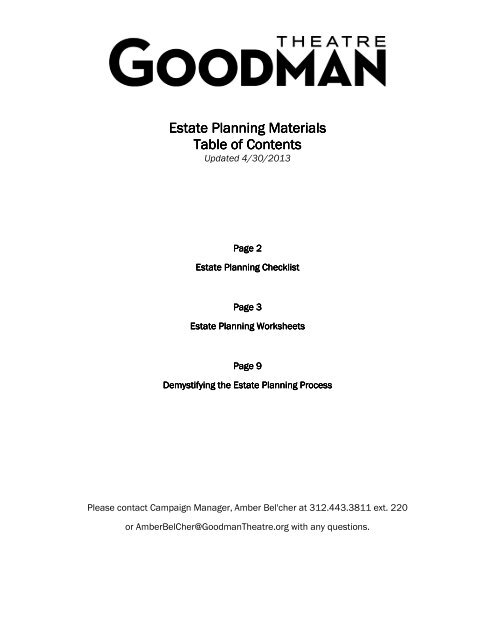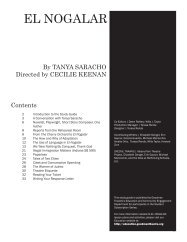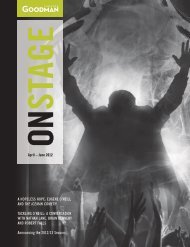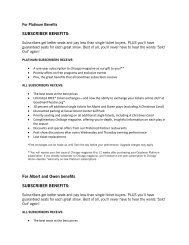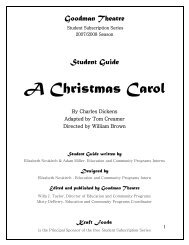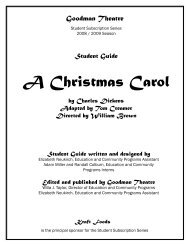Estate Planning Seminar Materials - Goodman Theatre
Estate Planning Seminar Materials - Goodman Theatre
Estate Planning Seminar Materials - Goodman Theatre
You also want an ePaper? Increase the reach of your titles
YUMPU automatically turns print PDFs into web optimized ePapers that Google loves.
<strong>Estate</strong> <strong>Planning</strong> <strong>Materials</strong><br />
Table of Contents<br />
Updated 4/30/2013<br />
Page 2<br />
<strong>Estate</strong> <strong>Planning</strong> Checklist<br />
Page 3<br />
<strong>Estate</strong> <strong>Planning</strong> Worksheets<br />
Page 9<br />
Demystifying the <strong>Estate</strong> <strong>Planning</strong> Process<br />
Please contact Campaign Manager, Amber Bel'cher at 312.443.3811 ext. 220<br />
or AmberBelCher@<strong>Goodman</strong><strong>Theatre</strong>.org with any questions.
<strong>Estate</strong> <strong>Planning</strong> Checklist<br />
April 30, 2013<br />
To Arrange Your <strong>Estate</strong> Plan<br />
When you make an appointment with an attorney to discuss estate planning, often they will send you some<br />
forms to fill out prior to the appointment. Here is an estate planning checklist of the type of information the<br />
attorney will be requesting.<br />
Personal & Family Information<br />
• Names<br />
• Addresses<br />
• Dates of birth<br />
• Phone numbers<br />
• Email Addresses<br />
• Citizenship status for you, your spouse, and all children<br />
Personal & Family Assets<br />
• Real <strong>Estate</strong><br />
- Location, how title is held, fair market value, mortgage amount<br />
• Personal & Household Belongings<br />
• Cash, Checking, Savings, CDs Pensions, Life Insurance, etc.<br />
- Including the names of the banks or companies<br />
• Business Interests<br />
• Investment Assets<br />
• Other Interests<br />
- Trusts, anticipated inheritance, other assets<br />
Personal <strong>Estate</strong> <strong>Planning</strong> Objectives<br />
• Choose your guardian, executor, and trustees<br />
• Liabilities<br />
• Disposition of assets<br />
• Income from assets<br />
• Overriding wishes<br />
To Execute Your <strong>Estate</strong> Plan<br />
To Settle Your <strong>Estate</strong> Your Executor Will Need<br />
• Your will/ trust<br />
• Insurance policies<br />
• Real <strong>Estate</strong> deeds<br />
• Certificates for stocks, bonds, and annuities<br />
• Information on bank accounts, mutual funds, and safe deposit boxes<br />
• Information on retirement plans, 401Ks, and IRAs<br />
• Information on debts: credit cards, mortgages and loans, utilities, and unpaid taxes<br />
• Usernames and passwords for your online banking, automatic bill payments, social networking sites, personal<br />
websites, and email accounts<br />
• Contact information for your immediate family and friends<br />
• Information on funeral prepayment plans and any final instructions you have given<br />
The information provided is a partial listing only to be used as a guide. . It is strongly recommended that you seek advice for your<br />
specific estate planning situation s<br />
from your attorney or financial advisor.
<strong>Estate</strong> <strong>Planning</strong> Worksheet<br />
April 30, 2013<br />
Family Member:<br />
Family Member:<br />
Friend:<br />
Friend:<br />
Primary Care Physician:<br />
Pediatrician:<br />
Guardian For Minors:<br />
Primary Medical Insurance:<br />
Financial Advisor:<br />
Attorney:<br />
Executor:<br />
Power of Attorney:<br />
Accountant:<br />
Dentist:<br />
Veterinarian:<br />
Telephone/ Cell Phone Provider:<br />
Cable Provider:<br />
Gas Company:<br />
Electric Company:<br />
Name Phone Number Email<br />
Name Phone Number Email<br />
Name Phone Number Email<br />
Name Phone Number Email<br />
Name Phone Number Email<br />
Name Phone Number Email<br />
Name Phone Number Email<br />
Name Phone Number Email<br />
Name Phone Number Email<br />
Name Phone Number Email<br />
Name Phone Number Email<br />
Name Phone Number Email<br />
Name Phone Number Email<br />
Name Phone Number Email<br />
Name Phone Number Email<br />
Name Phone Number Email<br />
Name Phone Number Email<br />
Name Phone Number Email<br />
Name Phone Number Email
Personal<br />
Example: Adoption Papers<br />
Social Security card<br />
Tracking Progress Documents<br />
Provider Contact Information<br />
John Smith 123 Birch Street,<br />
Allentown PA 18102 610.555.5555<br />
Where do I keep these papers?<br />
Black file cabinet, basement<br />
Birth certificates<br />
Passport/Citizenship papers<br />
Driver's license number and<br />
expiration date<br />
Adoption papers<br />
Marriage certificate<br />
Prenuptial agreement<br />
Divorce or separation papers<br />
Military discharge papers<br />
Safe and combination<br />
Safe deposit box and key<br />
Ownership<br />
Real estate deeds<br />
Provider Contact Information<br />
Where do I keep these papers?<br />
Motor vehicle title<br />
Other titles of ownership<br />
Appraisal and inventory of<br />
valuable items<br />
Tax<br />
Prior years' federal and state tax<br />
returns<br />
Federal/State gift tax returns<br />
Provider Contact Information<br />
Where do I keep these papers?<br />
Property and school tax records<br />
Online account access and<br />
tracking<br />
I still need to discuss with a Financial Advisor (circle items that apply)<br />
Monthly account statements<br />
Portfolio performance reviews
Banking Documents<br />
Account statements<br />
Tracking Progress Documents<br />
Provider Contact Information<br />
Where do I keep these papers?<br />
Checking statements<br />
Checkbook<br />
Savings statements<br />
Money market account<br />
statements<br />
Credit union account book or<br />
statements<br />
CD statements<br />
Credit card statements<br />
Debit card statements<br />
Online bill pay information<br />
Electronic banking and automatic<br />
investments<br />
I still need to discuss with a Financial Advisor (circle items that apply)<br />
Credit and debit cards with rewards<br />
Online account management<br />
programs<br />
<strong>Estate</strong><br />
Last will and testament<br />
<strong>Estate</strong> <strong>Planning</strong> Documents<br />
Provider Contact Information<br />
Where do I keep these papers?<br />
Living will/ Health care proxy<br />
Durable power of attorney<br />
Burial instructions<br />
Cemetery plot deed<br />
Prepaid cremation papers<br />
Funeral home preference and<br />
information<br />
Letter of instruction to executor<br />
Death Certificate
Insurance<br />
Long-term insurance policy<br />
<strong>Estate</strong> <strong>Planning</strong> Documents<br />
Provider Contact Information<br />
Where do I keep these papers?<br />
Life insurance policy<br />
Group life policies<br />
Health and accident insurance<br />
cards and claims record<br />
Mortgage insurance policies<br />
Travel and insurance policy<br />
Property and casualty policy<br />
Veterans administration insurance<br />
policy<br />
Beneficiary forms for insurance<br />
policy<br />
Personal & Charitable Trust<br />
Personal trust account<br />
Provider Contact Information<br />
Where do I keep these papers?<br />
Trustee information<br />
Charitable trust account<br />
Charitable donation references<br />
I still need to discuss with a Financial Advisor (circle items that apply)<br />
Trust and estate services Insurance planning and products Philanthropy and nonprofit services<br />
Wealth protection strategies<br />
Notes:
Investment Documents<br />
Brokerage account statements<br />
Provider Contact Information<br />
Where do I keep these papers?<br />
Mutual fund account statements<br />
Other managed account<br />
statements<br />
Stock certificates not held in an<br />
account<br />
Bearer bonds not held in an<br />
account<br />
Alternative investments (including<br />
K-1s)<br />
529 college savings plan<br />
statements<br />
Cost basis papers<br />
Online transaction confirmation<br />
Concentrated stocks<br />
I still need to discuss with a Financial Advisor (circle items that apply)<br />
Investment solutions Investment for education Managed accounts<br />
Alternative investments<br />
Retirement Accounts<br />
IRA Statements<br />
Provider Contact Information<br />
Where do I keep these papers?<br />
Company Retirement plan<br />
statements from all employers<br />
Other company benefits (stock<br />
options, deferred compensation<br />
Deferred compensation<br />
agreement<br />
Beneficiary forms for IRAs 401(k)s<br />
or other benefit plans<br />
Variable or fixed annuities<br />
statements<br />
Beneficiary forms or annuities<br />
policies<br />
I still need to discuss with a Financial Advisor (circle items that apply)<br />
Retirement planning 401 (k)s IRAs<br />
Distributions RMDs Annuities<br />
Asset Transfer solutions
Credit & Lending Documents<br />
Mortgage<br />
Provider Contact Information<br />
Where do I keep these papers?<br />
Home equity line papers<br />
Loan Management Account<br />
statements<br />
Securities -based loan<br />
Car loan<br />
Other outstanding loans<br />
Promissory notes<br />
Rental and/ or lease agreements<br />
I still need to discuss with a Financial Advisor (circle items that apply)<br />
Home financing Equity loans and lines Education funding<br />
Security - based financing<br />
Small Business Documents<br />
Incorporation/Ownership papers<br />
Provider Contact Information<br />
Where do I keep these papers?<br />
Financing papers<br />
Bank account statements<br />
Payroll records<br />
Employee records<br />
Employee retirement plans<br />
Stock option plans<br />
Other employee benefit plans<br />
Credit card statements<br />
Buy/Sell or partnership<br />
agreements<br />
I still need to discuss with a Financial Advisor (circle items that apply)<br />
Home financing Equity Loans and lines Education funding<br />
Security-based financing
DEMYSTIFYING ING THE ESTATE PLANNING PROCESS<br />
WHAT YOU NEED TO KNOW TO BE AN EDUCATED CONSUMER<br />
Provided by The Chicago <strong>Estate</strong> <strong>Planning</strong> Council<br />
I. Basic Overview<br />
A. Creating an estate plan can be an emotional topic. It is difficult to address your own mortality and<br />
talk about what will happen to your loved ones when you are no longer here. No matter how<br />
uncomfortable the issues are surrounding the estate plan, it is important to get past that hesitation<br />
and provide a roadmap to your survivors.<br />
B. One of the most common questions estate planners hear is “When do I need a will?” There are<br />
three general guidelines: (1) when you have a child; (2) when you have assets in excess of<br />
$100,000; or (3) when you have assets that you want to give to someone who will not receive them<br />
under the law.<br />
C. There are two groups of assets generally discussed as part of an estate plan, probate assets and<br />
non-probate assets. The easiest way to describe the difference between the two asset classes is to<br />
say that non-probate assets have a beneficiary designation (e.g. life insurance, 401(k), jointly<br />
owned house or bank account if rights of survivorship are included). Of course, if your beneficiary<br />
does not survive you, your non-probate asset may fall back into your probate estate. Probate assets<br />
are those that require a court procedure or court order to be validly transferred to the beneficiary<br />
under the applicable law.<br />
D. Unmarried individuals often need an estate plan more than married individuals, particularly if they<br />
are in a committed relationship. Without a legal marriage, the relationship will be ignored for<br />
purposes of both the care of an individual during disability and the distribution of property at death.<br />
A good estate plan can ensure that both issues are dealt with in the manner the individual intends.<br />
E. A basic estate plan should include a will, powers of attorney for property and health care, and<br />
possibly a revocable trust (living trust) and/or an insurance trust. Whether trusts are employed in<br />
the planning depends on several factors.<br />
F. For younger individuals, a revocable trust usually is warranted only where the assets (or combined<br />
assets of spouses) are approaching $1,000,000. If the individual owns quickly appreciating assets<br />
or anticipates a large outright inheritance, a revocable trust may also be recommended. For older<br />
individuals or ill individuals, a revocable trust often is recommended because it allows you to avoid<br />
probate and also serves to provide smooth transition of asset management if the individual<br />
becomes unable to manage his or her own affairs.<br />
G. Insurance trusts are used to remove life insurance proceeds from the taxable estate pool. Although<br />
life insurance proceeds generally are not subject to income taxes, they are subject to estate taxes.<br />
This type of planning is used to maximize the amount of assets passing to descendants.<br />
H. In addition to the personal goals that drive the planning, there are two tax schemes that influence<br />
estate planning. The first is the estate tax. Under current law, every individual will have a<br />
$5,250,000 federal estate tax exemption, a $4,000,000 Illinois estate tax exemption and can give<br />
unlimited assets to a citizen spouse without those assets being subject to estate tax. There is also<br />
portability between spouses that allows a surviving spouse to take advantage of the unused portion<br />
of the federal estate tax exemption of the predeceased spouse. The federal exemption of<br />
$5,150,000 will be adjusted annually for inflation.<br />
Page 1 4/30/13
I. The other tax scheme is the generation skipping transfer (GST) tax, which applies to transfers to<br />
grandchildren or younger generations. The GST exemption is also $5,250,000 and will be adjusted<br />
annually for inflation.<br />
J. <strong>Estate</strong> planning can also meet short term goals, such as appointing a short term guardian for minor<br />
children while the parent(s) are unavailable due to travel or other constraints. Illinois law provides a<br />
form (found at 755 ILCS 5/11-5.4) that allows parents to appoint someone to act as short term<br />
guardian for minors for a period of up to 365 days.<br />
II. Definitions Used In <strong>Estate</strong> <strong>Planning</strong><br />
A. Will: a legal expression of a person’s wishes regarding disposition of his or her property after<br />
death. The law requires certain special language and process to make the documents valid.<br />
• Testator: the person who makes a Will<br />
B. Trust: a form of ownership in which one party (the Trustee) holds and administers the property for<br />
the benefit of another (the Beneficiary)<br />
• Grantor/Settlor: the person who establishes a trust.<br />
C. Probate: a proceeding by which title to property of a decedent is transferred to the decedent’s<br />
heirs (if decedent died intestate, i.e., without a Will).<br />
• Executor: the personal representative nominated under a decedent's Will to administer<br />
the estate.<br />
• Administrator: the personal representative appointed by the court to administer the<br />
estate when there is no Will or no Executor nominated by the Will qualifies to act.<br />
D. Intestate Succession: the manner in which the law provides for disposition of a person's property<br />
among his heirs in an intestate (no Will) situation<br />
E. Land Trust: a method of holding title to real estate in Illinois, in which the legal owner is a Land<br />
Trustee, and the beneficial interest is owned by named individuals. A land trust provides some<br />
confidentiality regarding the names of the occupants of the property and is a method sometimes<br />
used to designate the successor owner of real estate without setting up a living trust or putting<br />
the property in joint tenancy.<br />
F. Surety: court ordered insurance policy, paid for by the estate, on an amount equal to one and<br />
one-half times the value of the personal property (i.e. everything other than real estate), to<br />
protect the heirs/beneficiaries from any wrongdoing by the personal representative.<br />
III. Why Do You Need a Will?<br />
A. Requirements for a Valid Will in Illinois<br />
• Must be 18 years of age<br />
• Testamentary capacity<br />
• In writing<br />
• At least two witnesses<br />
• Notary required to make Will “self proving” (i.e. avoid questions about whether it was<br />
signed properly)<br />
Page 2 4/30/13
B. What Happens if You Die Without a Will (Intestate)?<br />
• Your property is distributed according to statute as follows:<br />
If a decedent leaves surviving:<br />
A surviving spouse and descendants<br />
Descendants but no surviving spouse<br />
A surviving spouse but no descendants<br />
No spouse or descendants<br />
No spouse, descendants, parents, brothers or<br />
sisters, or descendants of brothers and sisters<br />
Distribution:<br />
50% to surviving spouse and 50% to descendants,<br />
per stirpes<br />
All to descendants, per stirpes<br />
All to surviving spouse<br />
Parents, brothers and sisters, in equal shares. A<br />
surviving parent receives a double portion. The<br />
descendants of a deceased brother or sister take<br />
their parent's share.<br />
50% to decedent's maternal grandparents or their<br />
descendants, per stirpes, and 50% to decedent's<br />
paternal grandparents or their descendants, per<br />
stirpes.<br />
*If children born outside of wedlock, see Illinois Probate Act, 755 ILCS 5/2-2 (h).<br />
** Partners in a civil union are treated as spouses for all purposes under Illinois law in accordance<br />
with the new Civil Union law.<br />
• If you die with a spouse and children, ½ of your estate will not be available to your spouse.<br />
• Probate court chooses the guardian for your minor children (children under age 18). The<br />
guardian of the person will have custody of the child. The guardian of the estate will handle the<br />
child's finances.<br />
Limits investment options<br />
Requires court permission for all distributions<br />
Expensive annual court filings and associated attorney fees<br />
Children get all the assets at age 18<br />
Annual surety bond required<br />
C. With a Will, You Can:<br />
• Distribute property in the manner and to whom you want<br />
• You choose your Executor to manage the cash and assets<br />
• You choose the guardian of the person for your minor children<br />
• You can establish trusts after your death for your children's share of the property, avoiding the<br />
need for guardian of the estate.<br />
• You can also provide at what age(s) the children receive money<br />
• You can waive surety and avoid that expense<br />
Page 3 4/30/13
IV. What is a Trust, and Why Do You Need One?<br />
A. Many Illinois clients use a Living Trust. A trust is a form of property ownership<br />
• Trustee holds title – any individual or authorized institution can serve as Trustee<br />
• Beneficiary is the person(s) for whose benefit the trust is established.<br />
B. Different types of Trusts<br />
• A Living Trust (also called a Revocable Trust) is created by you during your lifetime -- called a<br />
Declaration of Trust. You name yourself as Trustee, with successors named if you die or<br />
become incapacitated<br />
• Irrevocable Trust Agreement -- you name one or more other persons or a bank as Trustee<br />
during life.<br />
• Testamentary Trust is established under Will -- takes effect at your death<br />
C. Purposes and Advantages of a "Living Trust"<br />
1. Avoids probate at death -- No court proceeding needed<br />
• Trust assets are non-probate property<br />
• Trust instrument governs disposition of trust assets at death<br />
• Probate costs avoided<br />
• Privacy -- no public disclosure of your assets or your distribution plan<br />
• Avoids will contests<br />
2. Avoids need for a Guardian in the event of your incapacity<br />
• Trustee, or successor Trustee, continues management of your assets for your benefit<br />
• Avoids court determination of incapacity<br />
• Privacy and ease of burden on family<br />
3. No estate or gift tax consequences to transfer of assets to trust name. Funding the trust is<br />
an important part of process<br />
4. If the grantor acts as Trustee, there are no separate income tax reporting requirements<br />
because trust is a "grantor" trust. All items of income, deductions and credits are reported<br />
on grantor's own income tax return (Form 1040)<br />
5. A living trust may not make sense:<br />
• where assets are relatively minimal<br />
• where concerns about disability are resolved with use of Powers of Attorney<br />
• where family situation makes disagreements during disability or at death unlikely<br />
V. Why Use Trusts?<br />
• While you get a marital deduction for what is left outright to your spouse, remember that the<br />
spouse has complete control and can leave everything to a new spouse, who can spend it as he<br />
or she wishes<br />
• If it is a second marriage situation, your spouse may leave everything to his or her children, not<br />
yours<br />
• Consider using a QTIP (Qualified Terminable Interest Property) marital trust -- spouse receives<br />
income or a percentage distribution (unitrust) for life, and limited principal for purposes you<br />
define, but at death, assets pass to your intended beneficiaries (your children)<br />
• Using a trust can guarantee that children will receive their inheritance gradually, rather than at<br />
age 18 (A typical structure: in thirds at ages 25, 30, and 35)<br />
Page 4 4/30/13
VI. <strong>Planning</strong> for disability – Powers of Attorney and “Living Will”<br />
l”<br />
• The U.S. Supreme Court has ruled that a State has the right to keep a person alive by artificial<br />
means if the individual has not evidenced his or her intent to the contrary by some method that<br />
the State has approved, even though there is evidence that the person did not want to be kept<br />
alive by artificial means.<br />
• A Power of Attorney for Health Care and Living Will allow an individual to control his or her own<br />
medical care.<br />
A. Power of Attorney for Health Care<br />
1. An Agent named to make health care decisions for the principal in the event of illness,<br />
incapacity or incompetence<br />
2. Avoids guardianship of the person and court determination of incapacity<br />
3. Protection of health care providers adhering to agent's direction<br />
• If doctor or other health care provider is unwilling to comply with agent's direction, then<br />
patient's care must be transferred to another doctor or provider who will comply<br />
• Doctor or health care provider will not be subject to any type of civil or criminal liability<br />
or discipline for unprofessional conduct for complying with agent's decision, even if<br />
death or injury ensues<br />
4. Agent can be given authority to withhold or to maintain life-sustaining measures<br />
B. Power of Attorney for Property<br />
1. An Agent is named to manage property of the principal in the event of illness, incapacity or<br />
incompetence<br />
• The Principal is free to limit the powers granted<br />
• The Power of Attorney can be structured to come into effect at some future point, such<br />
as a doctor's determination of incapacity, rather than immediately<br />
2. Avoids guardianship of the estate and court determination of incapacity<br />
3. Agents may be given authority to transfer assets to a living trust and make gifts, but such<br />
gifts are closely examined by the IRS<br />
4. Power of attorney may survive adjudication of incapacity<br />
5. Authority terminates at death<br />
C. Living Will (also known as "Declaration of Intent")<br />
1. Direction to Physician:<br />
"If at any time I should have an incurable and irreversible injury, disease, or illness judged<br />
to be a terminal condition by my attending physician who has personally examined me and<br />
has determined that my death is imminent except for death delaying procedures, I direct<br />
that such procedures which would only prolong the dying process be withheld or withdrawn,<br />
and that I be permitted to die naturally with only the administration of medication,<br />
sustenance, or the performance of any medical procedure deemed necessary by my attending<br />
physician to provide me with comfort care."<br />
2. Physicians or other health care providers are under a duty to either comply with the<br />
provisions of the "living will" or to inform the patient or family of unwillingness so that<br />
transfer to a willing physician is possible.<br />
Page 5 4/30/13
VII. What You Need to Know About Transfer Taxes: How You Can Reduce Their Impact<br />
on You and Your Family<br />
A. Tax on Gratuitous Transfer of Wealth<br />
1. Unified System of Taxation<br />
• Gift Tax - taxes gratuitous transfer of wealth during lifetime (inter vivos)<br />
• <strong>Estate</strong> Tax - taxes transfer of wealth at death (testamentary)<br />
• Generation skipping tax ("GST-tax") - an additional tax on transfers during life or at death<br />
to grandchildren or more remote descendants<br />
2. Rates:<br />
• The Gift Tax and <strong>Estate</strong> Tax is a single 40% rate for amounts in excess of $5,250,000.<br />
• The GST tax is the same - 40%.<br />
3. Assets subject to estate tax<br />
• Virtually all assets owned by you at your death are counted, including real estate, stock,<br />
bonds, mutual funds, mortgages, notes, cash, business interests, collectibles,<br />
automobiles, jewelry, and personal effects<br />
• Life insurance proceeds on your life if you possess any incidents of ownership (e.g. you<br />
are the policy owner) with respect to the policy<br />
• Any annuity or other payment receivable at the time of your death. Property includable<br />
here includes commercial annuities, payments under retirement plans maintained by<br />
your employer, and individual retirement account (IRA) benefits<br />
• One-half of the value of property that you owned in joint tenancy with your spouse<br />
• The full value of property owned in joint tenancy by you and other individuals except<br />
Property acquired by you and other joint owner or owners by inheritance, gift or<br />
bequest; or<br />
To the extent the surviving joint tenants can prove an independent contribution to<br />
the value of the jointly owned property<br />
4. Income Tax Cost – Other than for deaths in 2010, the basis of property received from a<br />
decedent is generally adjusted or "stepped-up" to its fair market value at the time of death.<br />
This rule allows the beneficiaries to avoid the income tax on the appreciation of assets from<br />
the time the decedent purchased them until the date of death; however, there is no<br />
adjustment for assets passing as part of an IRA, 401(k) or other deferred compensation<br />
plan. Special rules apply for individuals who died during 2010.<br />
5. Illinois has enacted an estate tax for estates of decedents dying after December 31, 2010.<br />
There is an exemption per individual of $4,000,000 and an unlimited marital deduction.<br />
Therefore, an estate may owe Illinois estate tax, but no federal estate tax.<br />
B. Credits, Deductions and Exclusions<br />
1. Unified Credit (also called Applicable Exclusion)<br />
• Applies to both <strong>Estate</strong> tax and Gift tax<br />
• Permits aggregate tax-free transfers (during life and at death) of $5.25 million<br />
• Properly structured estate plans allow spouses to transfer up to $10,500,000 without<br />
any transfer taxes<br />
2. Unlimited Marital Deduction<br />
• Applies to both <strong>Estate</strong> tax and Gift Tax, as well as Illinois <strong>Estate</strong> Tax<br />
• Unlimited gifts or entire estate may be given to a citizen spouse free of federal and<br />
Illinois <strong>Estate</strong> and Gift taxation<br />
Page 6 4/30/13
• Most tax efficient estate plan uses the unified credit in coordination with the unlimited<br />
marital deduction<br />
• There are special rules for non-citizen spouses, and transfers generally are not tax-free.<br />
.<br />
New portability provision allows surviving spouse to utilize unused portion of the<br />
deceased’s spouse’s exemption amount if an election is made on a timely filed estate<br />
tax return.<br />
3. Transfers qualifying for marital deduction<br />
• Outright transfers to spouses<br />
• Transfers in trust for benefit of spouse<br />
full power of withdrawal<br />
general power of appointment<br />
"QTIP" - all income for life to spouse<br />
estate trust<br />
4. Annual Exclusion<br />
• Applies only to gift tax<br />
• Permits transfer to anyone (a "donee") of up to $14,000 annually free of gift tax<br />
Annual exclusion applies per donee<br />
"Gift splitting" - with consent of spouse, annual exclusion may be combined for a<br />
total of $28,000<br />
Inflation adjustment (if any) is determined annually.<br />
• Gift must be of a "present" as opposed to a "future" interest<br />
Outright gifts qualify<br />
Certain gifts in trust qualify<br />
5. Tuition and Medical Care<br />
• Applies only to gift tax<br />
• Unlimited amounts<br />
• Not applied against unified credit or annual exclusions<br />
• Payments must be made<br />
for tuition<br />
for medical care<br />
directly to the institution<br />
reimbursements do NOT qualify and will be considered taxable gifts subject to the<br />
annual exclusion limits<br />
• Can also utilize Section 529 Plans<br />
6. Charity<br />
• Qualified Transfers to charity during life or at death are entirely tax free.<br />
outright gifts qualify<br />
certain gifts in trust qualify<br />
Page 7 4/30/13
7. Generation-Skipping Transfer Tax Exemption<br />
• Taxes transfers to persons two or more generations younger than the transferor (e.g.<br />
grandchildren)<br />
• Rate - highest <strong>Estate</strong> tax rate (in 2013, 40%)<br />
• This tax is in addition to <strong>Estate</strong> and Gift taxes<br />
• In 2013, a $5,250,000 exemption is available.<br />
8. Using "By-Pass" Trusts for Tax Benefits (see chart)<br />
VIII. So I need an <strong>Estate</strong> Plan – Now What?<br />
• You should view selection of an estate planning attorney as you would shopping for any other<br />
product you purchase. Would you buy a 50-inch plasma television without doing your<br />
homework and testing out the products at the store?<br />
• A good estate planning attorney can be a trusted advisor not just in the financial arena. Ask<br />
the questions that will provide you with the information you need to determine whether the<br />
attorney is someone you feel comfortable with. Your estate planner will be able to serve you<br />
best if you are able to share honestly your thoughts and secrets. As such, you need to find<br />
someone who inspires trust and confidence.<br />
• It is important to inquire about the attorney’s credentials. Ideally, you want an attorney who<br />
spends a substantial amount of his or her time advising for and drafting estate plans.<br />
A. Outline your goals and concerns<br />
1. Always ask for a fee estimate, but understand that your efficiency drives the price. Before<br />
you meet with the attorney to begin the drafting process, think about who you want to<br />
receive your assets, restrictions you may want to place on access to the assets, and who<br />
will be named to serve as executor, guardian and trustee. Consider the following questions<br />
and have your own list of answers or questions when you meet with your attorney.<br />
a. Who is to receive your personal effects (such as clothing and jewelry), household<br />
effects (such as furniture and artwork), and vehicles (cars, boats, etc.)?<br />
b. Whom do you wish to name as guardian of your minor children?<br />
If you are considering naming a married couple, what would you want to have<br />
happen if they get divorced or one of them dies?<br />
Who will serve as successor guardian if your first choice cannot or will not act as<br />
guardian?<br />
c. Whom do you wish to name as executor of your will? Also provide the names of<br />
successor executors in case the original executor is unable or unwilling to act as<br />
executor.<br />
d. Do you wish to make any specific (cash or property) gifts to any individuals or<br />
charities?<br />
e. Who should receive the balance of your assets (after any specific gifts described in<br />
response to question d) upon your death?<br />
f. If you are leaving assets to your spouse, do you want those assets held in trust for the<br />
benefit of your spouse? Retaining assets in trust may provide protection from<br />
creditors.<br />
Who should act as trustee of assets held for your spouse? Successor trustee?<br />
Typically, tax benefits are achieved by providing that your spouse will receive all<br />
income from the trust. Should principal of the trust be made available as well? If<br />
so, under a broad “best interests” standard, or limited only to support?<br />
Page 8 4/30/13
Should your spouse have a right to redistribute assets among your descendants<br />
after your death (i.e. change your estate plan with respect to your descendants)?<br />
g. If you are leaving assets to children or grandchildren, should they be retained in trust?<br />
Who should act as trustee? Successor trustee?<br />
At what age(s) should the child or grandchild have independent access to the<br />
funds? (e.g. 1/3 at each of ages 25, 30 and 35)<br />
h. Who should ultimately receive assets if none of you, your spouse or children are<br />
living?<br />
i. Would you like to name an individual who would be able to make health care<br />
decisions for you if you are incapable of doing so for yourself?<br />
Who should act as your health care agent? Please provide the city and state of<br />
residence. Successors?<br />
Do you have special requests regarding burial, such as cremation?<br />
Do you want to be an organ donor? If yes, any restrictions?<br />
j. Would you like to name an individual who would be able to make financial decisions<br />
for you if you are incapable of doing so for yourself?<br />
Who should act as your property agent? Please provide the city and state of<br />
residence. Successors?<br />
Should any special restrictions be imposed upon this person’s ability to act? The<br />
law generally imposes a duty to handle assets only for your benefit.<br />
HELPFUL WEBSITES<br />
Chicago <strong>Estate</strong> <strong>Planning</strong> Council--cepcweb.org<br />
National Association of <strong>Estate</strong> <strong>Planning</strong> Councils-- naepc.org<br />
American Bar Association-- abanet.org/public.htm<br />
Page 9 4/30/13


